- Home
- Gordon Korman
Chasing the Falconers Page 3
Chasing the Falconers Read online
Page 3
Meg whispered a logical concern. “What if nothing fits?”
“It’s still better than burned pajamas and a jailbird suit.” Her brother pulled down a pair of khakis and a T-shirt.
Meg scowled at the label on her own selection. “Fatso! Hey, can you reach those shorts?”
The dog came out of nowhere, an oversize German shepherd in full flight. Against the backdrop of stillness, the barking was like the roar of carpet bombing exploding all around them.
The Falconers dropped the clothes and ran. The animal bounded after them, and Aiden realized with a sinking heart that there was no way they could escape. Two kids, exhausted and sleep deprived, didn’t stand a chance against a full-speed attack dog.
As they scrambled around the laundry carousel, Meg reached up and yanked on a large white sheet. It billowed down, engulfing the leaping dog. The shepherd yelped and hit the ground, wrapping itself in linen.
It was all the time Aiden and Meg needed. They raced into the barn and clambered up the ladder to the loft. Through a small window, they could see the white sheet jerking around like a spastic ghost as the dog struggled to free itself.
“It’ll come after us,” quavered Meg.
“Shhh. I don’t think it can get up the ladder.”
Crouched amid the bales of hay, Aiden was aware of an all-too-familiar smell. He looked down into the barn. Cows. Was there no escaping them?
“Someone’s coming!” Meg hissed.
Sure enough, a light was shining in the house. Then the porch lamp came on.
The Falconers threw themselves flat to the floor of the loft and prayed.
A woman’s angry voice called, “Fool dog! Are you into my laundry again?”
The animal did everything but talk. In the chorus of barking, Aiden could almost hear it: Call the police! There are two escaped convicts hiding in our hayloft!
But all the woman could see was her soiled sheet. “Bad dog! And stay away from that barn. You don’t rile up the cows before milking. What’s gotten into you?”
Aiden sneaked a look. The woman had gone back inside. A second later, the chastised shepherd slunk into the barn. Parking itself at the bottom rung of the ladder, it glared up at the loft, sniffing and growling.
“Now what?” whispered Meg.
Aiden wasn’t sure. How long would the dog wait there for them? Hours? Days? Mom and Dad had traveled a lot on the lecture circuit, so the Falconers had never had a pet. How patient could man’s best friend be? And how long before the people who lived here figured out that the shepherd was trying to tell them something?
Aiden would not have believed it was possible to sleep in this situation. But the next thing he knew, it was full daylight, and Meg was flaked out in the straw beside him, dead to the world.
He gave her shoulder a gentle shake. “Meg — ”
She started. “I’m awake!”
“Shhh!”
There was a mechanical hum coming from the barn below, and the occasional clanking noise. Milking machines.
Aiden risked a look down the ladder. A chorus of angry barking rose to greet him.
“Get out of here, Sparky!” snapped a man’s voice. “Every time you chase a rat up that ladder, we have to put up with your infernal racket!”
The two rats in the loft looked at each other hopelessly. How were they ever going to get out of there?
At last the milking was over, and the cows were taken out to pasture. Sparky never moved a muscle. He sat like a sentry, practically hugging the base of the ladder.
“We’re going to have to run for it,” whispered Meg.
“We wouldn’t stand a chance.”
It was high noon before the farmer, his wife, and three children piled into a huge SUV parked in the driveway.
“Sparky! Where is that dog?”
The eldest son ran to the barn, grabbed Sparky by the collar, and hauled him away to the car.
The Falconers did not allow themselves to breathe until the sound of the motor had faded into the distance.
They scampered down the ladder and out of the barn.
“It’s a good omen,” Meg decided. “It means we’re lucky.”
Of all the words that described their situation, “lucky” was the one Aiden would have picked last.
Back at the carousel, they selected clothes at their leisure. Aiden’s khakis were loose, but a tackle harness made a suitable belt. The items Meg selected fit perfectly. There was even an old pair of sneakers that cradled her cut and bruised feet as if custom-made.
She looked hopefully at her brother. “I’m starving.”
“No way,” he said firmly. “For all we know, they’ve got a burglar alarm in that house. Or an old grandmother.”
“Or another dog,” she agreed, chastened. “But Aiden — look!”
Hanging on wall hooks were three well-used mountain bikes.
“We don’t need them,” Aiden said stubbornly. “Everybody’s been treating us like criminals. Let’s prove them wrong.”
“They’re speed. And the faster we get away from here, the safer we’ll be.” Meg could see she was getting through to him, and hurried on. “Besides, we’re only borrowing them. We’ll just ride to the nearest town, someplace where we can get on a train or bus.”
“Yeah, but a train or a bus to where?” Aiden voiced the concern that had been eating him up inside since they’d first turned their backs on the burning wreckage of Sunnydale. “Where is this mystery destination of ours?”
“Florida,” Meg replied readily. “That’s where Mom and Dad are.”
A wave of tenderness washed over him. His little sister had so much spirit. She was bent down by these past months but never broken.
“To do what?” he asked gently. “To bust them out of jail? You’re talking about federal prisons, Meg. You can’t knock them out with a kerosene lamp. Besides, that’s the first place they’ll look for us.”
Her expression grew stormy. “Well, what’s your plan, besides shooting holes in mine? Our parents are in jail because we can’t get our act together to get them out!”
Aiden knew he had to reach her — really reach her — and right now. “There’s nothing I wouldn’t give for the four of us to be together as a family again. But to say that Mom and Dad are where they are because of us — you’ll drive yourself crazy thinking that way. This is not within our power to change. Our parents are locked up because Frank Lindenauer wouldn’t come forward to admit they worked for the CIA. That’s it.”
“Well, then, that’s what we have to do,” she said simply. “We’ll find Frank Lindenauer.”
Her brother stared at her. He did not have the heart to drag her back to cruel reality again. To explain that if teams of lawyers and private investigators couldn’t find Lindenauer, what chance did two kids on the run have? She would have to face it sooner or later, but not today. Today the poor kid had to win at something.
“We’ll take the bikes,” he conceded.
After drinking deeply at the garden hose and inhaling a few not-quite-ripe peaches from the tree in the front yard, the Falconers returned to the road, this time on wheels.
Once he was riding down the two-lane highway, Aiden’s spirits improved. Being on a bike again just seemed so — normal. It was something from his regular life, not this improbable nightmare that had replaced it. The wind in his hair felt great.
Meg had to feel it, too. At eleven years old, Aiden thought, this is what she should be doing, not fleeing for her life. Meg was too young to really remember the summer the Falconers had vacationed with “Uncle Frank” — the only time Aiden remembered meeting Frank Lindenauer.
It was amazing. After all the years the Falconers had known the man — even before they knew of his CIA connection — they didn’t have a single photograph of him, or a single document with his name on it. Nothing that would prove his existence.
Yet Aiden recalled that vacation vividly. He’d been six, and Meg not quite two. The memories of the hous
e were the clearest — a pretty white cottage with red shutters, on the Vermont side of Lake Champlain. The Falconers had gone back there for several summers after that. Enough years that Aiden had established his own secret hiding place behind a loose piece of paneling in his tiny bedroom. It made him blush to think of what passed for treasure in those days — bottle caps, rocks, Cracker Jack prizes, and a handful of pictures from his sixth birthday present, a little box camera. He could almost see the array of dumb family photos: Mom and Dad clowning around, Meg in her stroller, Uncle Frank and his girlfriend in lounge chairs —
Without warning, Aiden’s bike veered off the shoulder and into the ditch, dumping him unceremoniously in the tall grass. He lay there, stunned, as Meg leaped off her own bicycle and rushed to his side.
“Aiden! What happened?”
He accepted her proffered hand and hauled himself to his feet. “I — ” It hardly seemed possible after everything that had happened — the investigation, the defense, the trial. And yet it was staring him right in the face. “I think I’ve got a picture of Frank Lindenauer!”
Breathlessly, he explained to Meg about the summerhouse in Vermont.
She was furious. “Why didn’t you remember that when it was important? When the trial was going on?”
“It wouldn’t have made the difference between guilty and innocent,” Aiden reasoned. “It’s just a picture of a guy sitting by the pool.”
“So what good is it to us now?” asked Meg, deflated.
“Maybe none. But it’s someplace to start. It’s our only clue.” He looked hopeful. “A name can be faked, but you can’t fake a face. If the picture’s still there, we have someone to look for.”
All at once, Meg was energized again. “Well, what are we waiting for?”
Aiden was actually laughing as he stood up and righted his bike on the pavement. There was something contagious about his sister’s enthusiasm, but he had to bring her back to earth. “It’s not as easy as you think, Meg. We haven’t been there in years. I don’t have an address.”
She was unperturbed. “Vermont. East.”
By the crazy logic of the fix they were in, it almost made sense. To stay here meant capture. They had to go somewhere.
Why not Vermont?
* * *
Agent Emmanuel Harris of the FBI took a sip of coffee and nearly sprayed it all over his desk. How was his lamebrain assistant ever going to make it as an investigator if she couldn’t even remember that her boss took his coffee black? Black meant black — no milk, no powdered stuff, no sugar, no Nutra-Sweet. Harris was a tolerant man, but that didn’t extend to coffee.
He was about to unleash his famous sarcasm, his fist hovering over the intercom button, when he spied the item on his computer screen. The Bureau provided its agents with real-time updates on all law-enforcement stories around the world. It was just a few lines — barely a paragraph. But the words jumped out at him — Juvenile Corrections.
GIBBON, NEBRASKA: A suspicious fire last night destroyed Sunnydale Farm, an alternative minimum-security detention facility run by the Department of Juvenile Corrections. No injuries have been reported, but seventeen of thirty inmates are still at large and possibly dangerous….
“Not my problem,” he said aloud, but made no move to scroll down from the report.
They were in the juvenile system somewhere. That was where they’d been bounced after the foster homes hadn’t worked out.
Silly, he told himself. There were tens of thousands of teens in hundreds of facilities around the country. This was one little farm. The chance they were involved was less than slim. And yet …
He found himself dialing the number of the Department of Juvenile Corrections in Washington, DC. There was the usual runaround before Harris found himself on the phone with Deputy Director Adler.
“I heard you had a little trouble at Sunnydale Farm in Nebraska last night. Any idea if Aiden and Meg Falconer are among the missing?”
There was a long pause on the line. Then, “I can check the list. Give me the spelling of their last name.”
With effort, Harris uncrossed his long legs and crossed them in the other direction. He was six foot seven, and the FBI didn’t seem to have a desk large enough to accommodate him. “Falconer. As in the children of John and Louise Falconer.”
“Oh!” The deputy director sounded ruffled. “Those Falconers. Well — uh — I’ll have to look into … ”
Harris wasn’t listening any longer. The young Falconers’ identity was probably under the highest level of secrecy. But he could hear it in Adler’s voice. Something was up with those kids. And the department didn’t want to admit it.
Adler was still hemming and hawing. “… so if you’ll leave your number, I’ll get back to you when I have more information.” Then he added, “What’s the big interest in these two, anyway?”
Harris let out his breath and realized he’d been holding it.
“I’m the one who put their parents away for life.”
* * *
It wasn’t a town exactly, or even a village. It was more a cluster of modest homes dotted around a gas station with a mini-mart.
Aiden and Meg left the road and struggled with their bikes over uneven ground and through dense underbrush. They were still too close to Sunnydale to risk being seen by the local population.
But as they circled around the back of the ramshackle garage, Aiden had a change of heart.
“I think we have to go in there,” he murmured, gesturing to the mini-mart.
Meg was nervous. “Shouldn’t we stay out of sight?”
“As much as we can,” he agreed. “But look.” He pointed to the flyspecked window at the rear of the store. Inside, tacked to the wall behind the cash register, was a large map. “It’ll tell us where the towns are around here. We’ll never get anywhere if we can’t find a place with some transportation.”
They stashed their bikes in an undergrowth of honeysuckle and crept toward the gas station, staying low in the tall grass. With Aiden in the lead, they came around the corner of the building and surveyed the terrain.
The mini-mart was empty. At the pumps stood a tall, gangly teenager in oil-spattered coveralls, filling up a Ford pickup and making small talk with the driver. His back was to them.
Aiden decided to chance it. Pulling Meg by the hand, he darted across the blacktop and eased open the door of the mini-mart. He was congratulating himself on their stealth when the bell sounded.
It was only a little ringer attached to the door. But to the two fugitives, it might as well have been a bomb blast. Aiden jumped, and Meg let out a yelp of shock.
The gas attendant looked over, and the Falconers rushed inside, faces averted.
From the grease pit adjoining the store, a voice called, “Be with you folks in a few minutes.” Through the glass, they could see light coming from beneath an old Chevy.
“No hurry,” said Aiden in a shaky voice. The two went straight to the map.
They were in a place called Buffalo County, Nebraska.
“No wonder they didn’t need bars to keep us at Sunnydale,” Meg whispered. “Where was there to go?”
“Shhh,” Aiden cautioned. “Right there.” His finger traced a single line marked with short crossbars. It traversed the county from east to west. “Railroad tracks,” he told her. “And not too far from here. If we can find those tracks, all we have to do is follow them until we come to a station. Probably in” — he pointed — “Gibbon.”
“Where’s that from here?” asked Meg.
“South. We’re headed east. That means we just have to find somewhere to make a right turn and keep on going until we hit the tracks.”
Meg nodded. “Let’s get moving.”
The country-western music coming from the radio in the grease pit was replaced by an announcer’s voice. “It’s eighty degrees in Omaha, eighty-two in Lincoln, and seventy-six in Scott’s Bluff. In news around the state, police and juvenile authorities continue to sear
ch south-central Nebraska, rounding up the runaways from the Sunnydale Juvenile Detention Center.”
Aiden froze with his hand on the doorknob.
“The facility burned to the ground under mysterious circumstances last night. No one was injured, but eleven of thirty young offenders are still unaccounted for.
“In national news … ”
A sharp finger in the ribs brought Aiden back to life.
“Come on!” hissed Meg.
Aiden threw open the door. There, wiping his hands on a dirty rag, stood a burly middle-aged man with a smudged face under a three-day growth of beard.
His eyes narrowed at the sight of them. “Never seen you kids around here before.”
Aiden was too devastated for speech. They had finally found a purpose — were heading toward something. They had a plan, no matter how flimsy. And it was all coming to an end because the local news in Nowheresville, Nebraska, came on at the wrong time.
Meg stepped around him and gave the man a dazzling smile with full teeth and dimples. “You can say that again, mister. We are so lost!”
He looked unconvinced. “Where are you heading?”
“We’re staying at our uncle’s place. He’s got a pig farm outside Kearney. And — no offense, I’m sure it’s a great place — but it stinks to high heaven. I mean, we were choking! So we got on our bikes and rode out. Aunt Cassie is going to kill us.”
He studied her face. “That would be Cassie Whipple out at the old Ackerman property?”
Aiden held his breath and tried to communicate with his sister by telepathy: It’s a trap!
He needn’t have worried. Meg did not rise to the bait. “No. Cassie Ferguson. Aunt Cassie and Uncle Don. So anyway, we came in to check your map.”
“So you know you kids are way off course. Kearney’s twenty miles west of here.”
“Yeah, thanks,” said Meg. “Come on, bro, we’d better hit the road.”
They breezed past him and walked quickly across the blacktop, feeling the man’s eyes — and the gas jockey’s, too — burning into the backs of their heads. The instant they were around the side of the building, they broke into a full sprint to where they’d left the bikes.

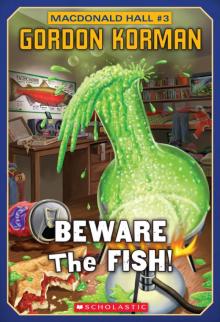 Beware the Fisj
Beware the Fisj Slacker
Slacker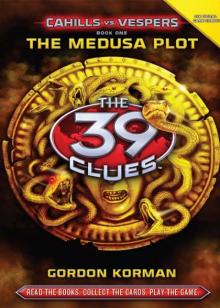 The Medusa Plot
The Medusa Plot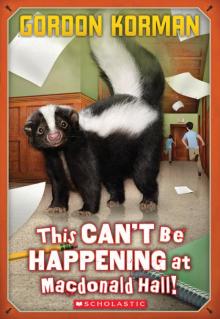 This Can't Be Happening at MacDonald Hall!
This Can't Be Happening at MacDonald Hall!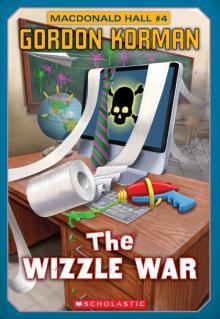 The War With Mr. Wizzle
The War With Mr. Wizzle The Emperor's Code
The Emperor's Code Zoobreak
Zoobreak The Danger
The Danger Unsinkable
Unsinkable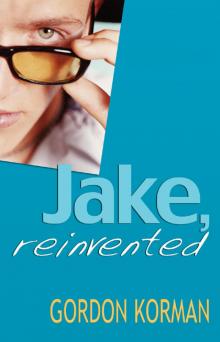 Jake, Reinvented
Jake, Reinvented No More Dead Dogs
No More Dead Dogs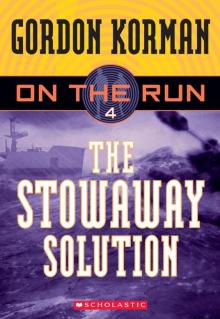 The Stowaway Solution
The Stowaway Solution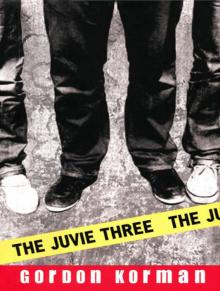 The Juvie Three
The Juvie Three The Climb
The Climb Criminal Destiny
Criminal Destiny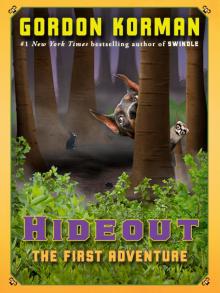 Hideout: The First Adventure
Hideout: The First Adventure Flashpoint
Flashpoint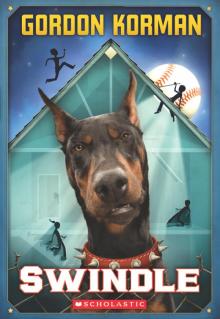 Swindle
Swindle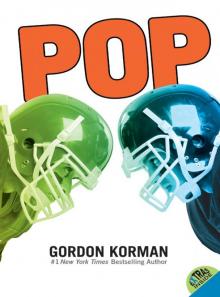 Pop
Pop The Rescue
The Rescue Memory Maze
Memory Maze The Sixth Grade Nickname Game
The Sixth Grade Nickname Game Vespers Rising
Vespers Rising Collision Course
Collision Course The Abduction
The Abduction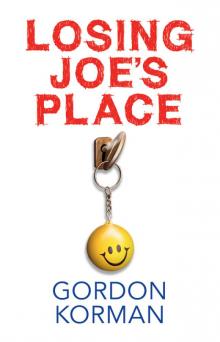 Losing Joe's Place
Losing Joe's Place The Dragonfly Effect
The Dragonfly Effect The Hypnotists
The Hypnotists Survival
Survival Lights, Camera, DISASTER!
Lights, Camera, DISASTER! Payback
Payback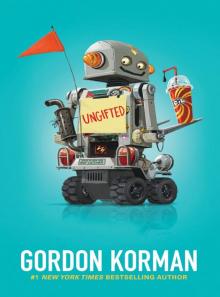 Ungifted
Ungifted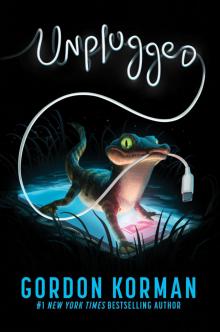 Unplugged
Unplugged Framed
Framed Supergifted
Supergifted Masterminds
Masterminds Jackpot
Jackpot Don't Care High
Don't Care High The Deep
The Deep Go Jump in the Pool!
Go Jump in the Pool! The Contest
The Contest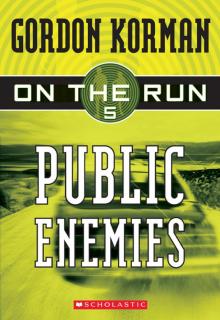 Public Enemies
Public Enemies Hideout: The Second Adventure
Hideout: The Second Adventure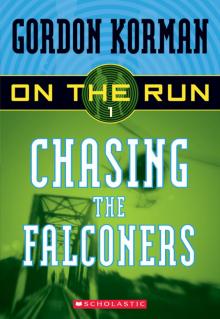 Chasing the Falconers
Chasing the Falconers One False Note
One False Note Shipwreck
Shipwreck Jingle
Jingle Unleashed
Unleashed Son of the Mob
Son of the Mob Now You See Them, Now You Don't
Now You See Them, Now You Don't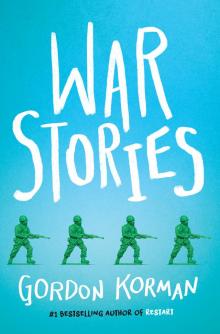 War Stories
War Stories Schooled
Schooled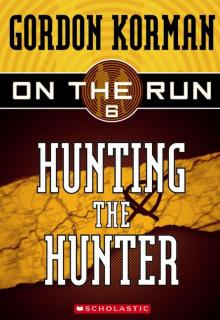 Hunting the Hunter
Hunting the Hunter The Zucchini Warriors
The Zucchini Warriors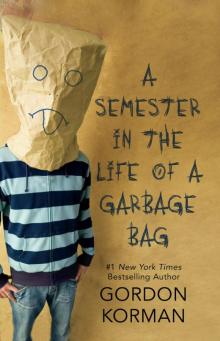 A Semester in the Life of a Garbage Bag
A Semester in the Life of a Garbage Bag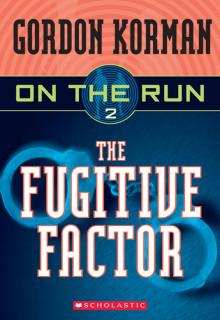 The Fugitive Factor
The Fugitive Factor Born to Rock
Born to Rock The Summit
The Summit Showoff
Showoff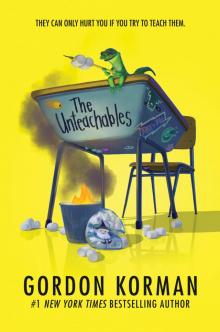 The Unteachables
The Unteachables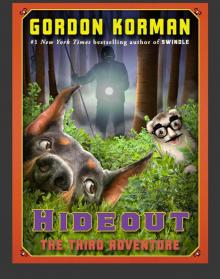 The Third Adventure
The Third Adventure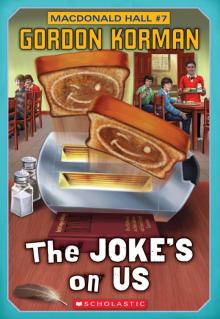 The Joke's on Us
The Joke's on Us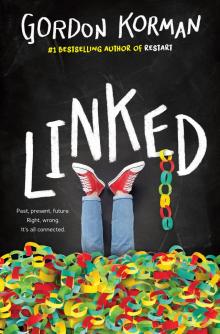 Linked
Linked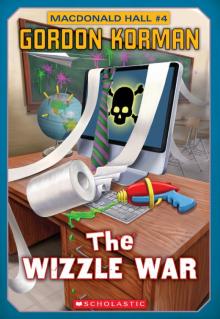 The Wizzle War
The Wizzle War The 6th Grade Nickname Game
The 6th Grade Nickname Game The Second Adventure
The Second Adventure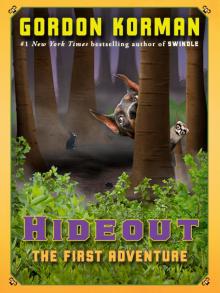 The First Adventure
The First Adventure![39 Clues : Cahills vs. Vespers [01] The Medusa Plot Read online](http://i1.bookreadfree.com/i2/04/10/39_clues_cahills_vs_vespers_01_the_medusa_plot_preview.jpg) 39 Clues : Cahills vs. Vespers [01] The Medusa Plot
39 Clues : Cahills vs. Vespers [01] The Medusa Plot